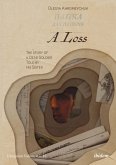This book is the story of one death among many in the war in eastern Ukraine. Its author is a historian of war whose brother was killed at the frontline in 2017 while serving in the Ukrainian Armed Forces. Olesya Khromeychuk takes the point of view of a civilian and a woman, perspectives that tend to be neglected in war narratives, and focuses on the stories that play out far away from the warzone. Through a combination of personal memoir and essay, Khromeychuk attempts to help her readers understand the private experience of this still ongoing but almost forgotten war in the heart of Europe and the private experience of war as such. This book will resonate with anyone battling with grief and the shock of the sudden loss of a loved one.
Dieser Download kann aus rechtlichen Gründen nur mit Rechnungsadresse in A, B, BG, CZ, D, DK, EW, E, FIN, F, GR, HR, H, I, LT, L, LR, NL, PL, P, R, S, SLO, SK ausgeliefert werden.









